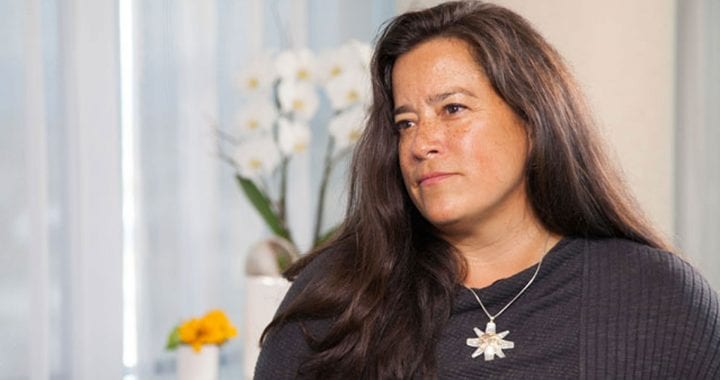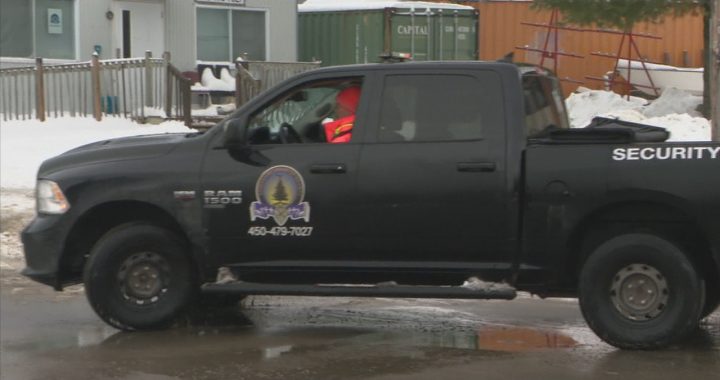He wasn’t invited, but the Mayor of Oka showed up to a peaceful protest held by Kanesatake residents on Thursday to mark the International Day of Human Rights.
They gathered at the Oka golf course, where a proposed expansion project served as the catalyst for the so-called 1990 “Oka crisis.”
“I don’t need an invitation, the golf course belongs to the municipality of Oka,” Pascal Quevillion told APTN News.
The Mohawks say the neighbouring municipality has ignored their fundamental rights for hundreds of years – but Quevillion, in turn, says their cause is rooted in “fake news.”
“I’m here today to establish facts – to establish peace. Because what Ms. Gabriel (Ellen Gabriel) is doing is stirring the pot between our communities,” Quevillion explained. “What she’s saying is false.”
The municipality, however, is petitioning to have the Pines – an ancestral forest on Kanesatake lands – designated a Quebec heritage site.
Despite Quevillion’s insistence that Oka is merely trying to “save the trees,” a legal analysis completed on behalf of the Mohawk Council of Kanesatake revealed a possible hidden agenda.
According to the analysis, this heritage designation would give Oka the right to control and/or veto any projects or initiatives that involve the Pines, including developer Gregoire Gollin’s offer to donate a portion of the forest back to Kanesatake Mohawks through the federal government’s “ecological gift” program.
Those at the heart of the cause insist land theft – and blatant human rights abuses – are still occurring on Quevillion’s watch.
“Oka keeps taking land, and the Federal government is really doing nothing to respect the human rights of the people here in Kanesatake. We’re tired of being pushed around,” explained Kanien’keha:ka activist Gabriel, who served as a de-facto spokesperson during the 1990 siege.
“We had a very rough summer, between the Gollin development, and the archaeological digs – so we’re fed up,” Gabriel added.
Read More:
Kanesatake grand chief says Oka’s attempt to take over the Pines is ‘mind boggling’
Despite promises to cease work, development on a disputed parcel of Kanesatake lands continued through the summer.
A group called Kanehsatake Land Defenders, interrupted an unauthorized archaeological dig where Oka plans to build a new recreation centre.
Most recently, signs asserting Mohawk territorial rights – ones strung up at the Pines and the development site – are reportedly being torn down or destroyed after nightfall.
“We’ve been putting up signs. I don’t know what the threat is,” explained Kanesatake resident Alan Harrington. “It’s just signs. We’re stating that we’re done with this. This is happening right across our territories, across Canada and Turtle Island. And you know, enough is enough.”
“Where are the people supposed to go when the land is gone? When it’s all developed?” Harrington asked.
There are rumours the Oka Golf Club, too, is up for sale – something Quevillion categorically denied during his drop-in Thursday.
“The golf course is not sold – it’s fake news,” Quevillion said.
“We don’t believe you – we don’t believe you whatsoever,” Gabriel retorted.
One resident asked Quevillion whether he was promising not to sell the golf course. He replied “yes.”
Another resident approached him to say she doesn’t understand the animosity between Kanesatake and Oka.
“We are caught between the land claims and the federal government. The citizens of Oka are caught up in both – [but] I wasn’t there 300 years ago,” Quevillion responded.
In a statement, the organizing group called out Mohawk Council’s lack of transparency, Oka’s lack of free, prior and informed consent, as well as inaction by the Federal government.
“This inaction and failure to uphold the highest standards of human rights for Indigenous peoples by Canada and Quebec have caused much stress, hardship, and threats to the safety and well-being of the Kanien’keha:ka of Kanehsatake,” the statement reads.
Gabriel insists she has written to federal officials asking for assistance, but has not received a reply.
“The world should watch Canada for the violations that they continue to impose upon people who have rights – have human rights. Our inherent rights are not dependent on Canada’s sovereignty or permission,” she added.
But Quebec officials, for their part, moved to rectify the situation before end of day.
By early afternoon, the province’s Indigenous Affairs ministry issued its own statement to announce the appointment of a negotiator.
The hope is to “identify possible solutions to cohabitation issues affecting the municipality of Oka and the community of Kanesatake,” according to a government release.
“[Minister Ian Lafreniere] has appointed Paul Girard to identify feasible solutions to these questions. His extensive professional experience gives him the tools he needs to fulfil his mandate which will involve meeting with stakeholders on the ground and finding compromises that will lead to better cooperation and promote partnerships in the region,” Quebec’s statement reads.
Girard is expected to turn his findings over to the government by the end of March 2021.
Although 30 years have passed since the Mohawks faced off against the Canadian army, Gabriel says real discussions have not yet begun.
“We know that there are two standards of rights, and as far as we’re concerned – the way we’re treated – we’re like the disposable people of Canada,” she explained.
“We’re not tolerating this.”










